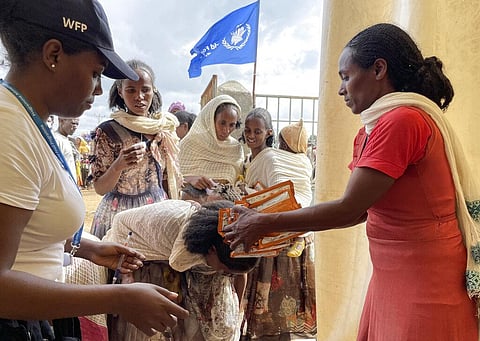

NAIROBI: Ethiopian military airstrikes on Friday forced a United Nations humanitarian flight to abandon its landing in the capital of the country’s Tigray region, two aid workers said, and an Ethiopian government spokesman confirmed that authorities were aware of the inbound flight.
The development appears to be a sharp escalation in the intimidation tactics that Ethiopian authorities have used against aid workers amid the intensifying, year-long Tigray war.
The aid workers spoke on condition of anonymity because they were not authorized to share the information with the media.
Ethiopian government spokesman Legesse Tulu told The Associated Press authorities were aware the U.N. flight was in the area but said that U.N. and military flights had a “different time and direction.” It wasn't immediately clear how close the Ethiopian warplanes came to the U.N. aircraft.
Legesse said the airstrikes in the city of Mekele targeted a former military training center now being used as a “battle network hub” by rival Tigray forces.
A military spokesman didn’t immediately respond to questions about the U.N. flight, which had planned to land in Mekele, the main base of humanitarian operations in Tigray.
Ethiopia’s government in recent months has accused some humanitarian groups of supporting the Tigray forces, and last month it took the extraordinary step of expelling seven U.N. officials while accusing them without evidence of falsely inflating the scale of the Tigray crisis.
Authorities also have subjected humanitarian workers on U.N. flights to intrusive searches while imposing what the U.N. has called a “de facto humanitarian blockade” on the region of some 6 million people, where the AP has reported that people have begun to starve to death.
Residents in Mekele confirmed the latest airstrikes. One said they occurred near Mekele University. There was no immediate information on any casualties.
Spokesmen for the Tigray forces have denied that sites targeted earlier this week were used in relation to the fighting. Health workers and other residents have said at least three children have been killed and more than a dozen people injured.
Thousands of people have been killed since November, when a political falling-out between the Tigray forces who long dominated the national government and the current administration of Prime Minister Abiy Ahmed erupted in fighting.
Tigray's 6 million people are now under a government blockade, while Tigray forces in recent months have taken the fighting into the neighboring Amhara and Afar regions. The U.N. says more than 2 million people are now displaced.
On Thursday, Ethiopia's government claimed to a successful strike against another military base used by the Tigray forces near Mekele, but Tigray forces spokesman Getachew Reda asserted that air defenses prevented the plane from hitting targets in the city.
An airstrike on Wednesday hit an industrial compound the government said was used by the Tigray forces to repair weapons. A Tigray spokesman denied the site had military significance and said it was used to produce cars and tractors. Two other airstrikes hit the city on Monday.
Tigray remains under a communications blackout, making it difficult to verify claims.
The airstrikes have come amid reports of renewed heavy fighting in Amhara, despite repeated international calls for a cease-fire in the war. On Wednesday, spokesman Getachew claimed advances had put the government-held towns of Dessie and Kombolcha “within artillery range,” prompting alarm.
Dessie hosts a large number of displaced people who have fled fighting further north.